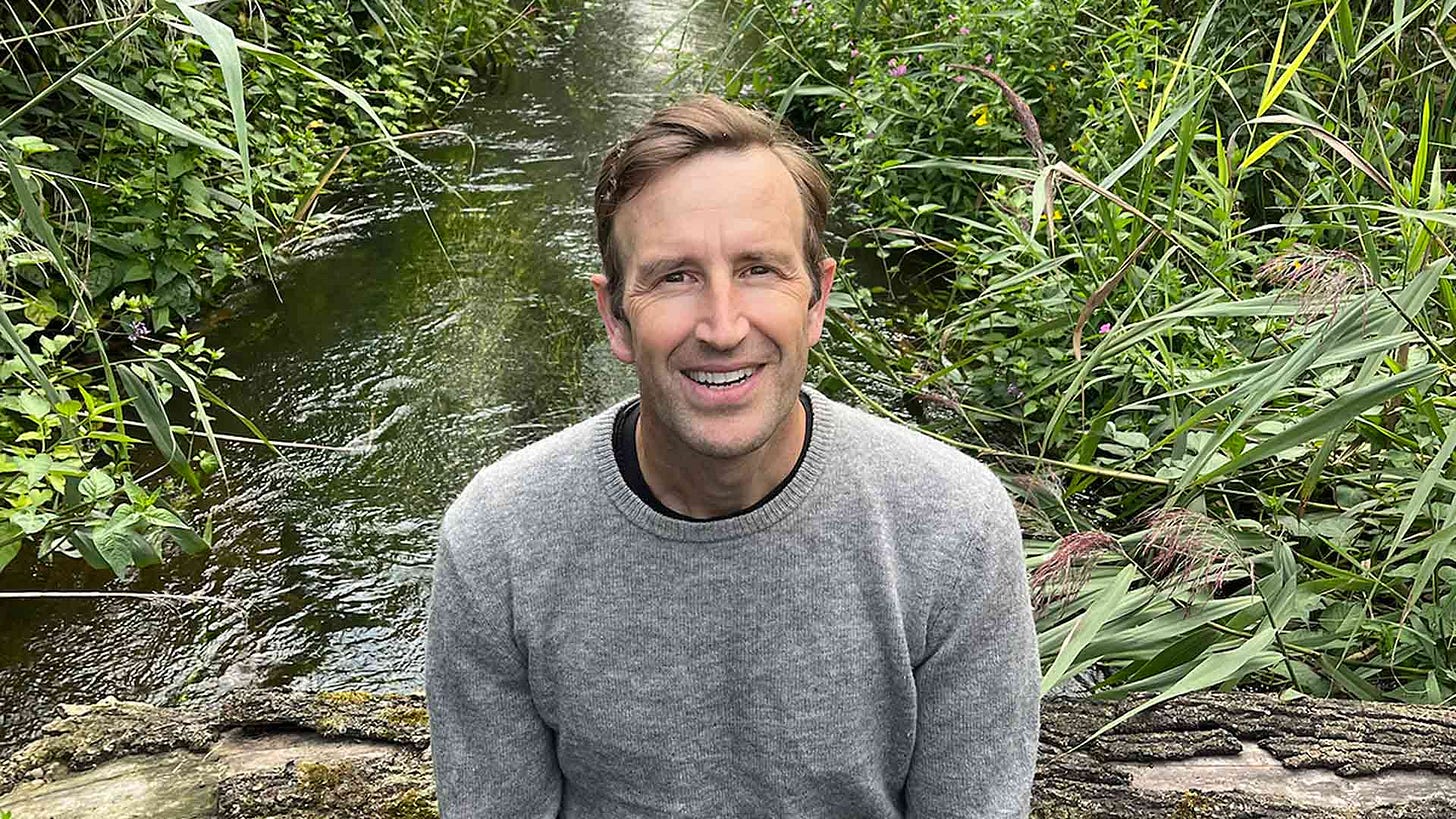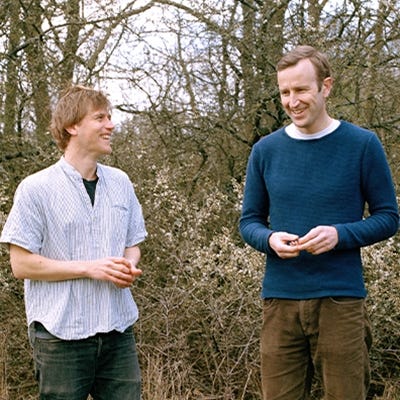Been to see the river man. Robert Macfarlane © Mark Wormald
I’ve just finished Robert Macfarlane’s latest book, Is a River Alive?
I took my time over it. Usually, with an author you like or one who tells a story well, you take the pages at a kind of jog-trot. But Macfarlane’s books are all about walking, pausing, reflecting, peering, going back over your steps if you need to. That’s how you best read him.
In his career, he has found ancient tracks, sought out Britain’s wild places, scaled mountains, and ventured beneath the surface of the earth. In this one, he goes further into the far-off lanes of river valleys, sources and systems in Ecuador, India and Canada, punctuated by reflective visits to the springs near his Cambridge home.
His book titles (Underworld, The Wild Places, The Old Ways) are lyrical signifiers of the dedicated nature-writer. Is a River Alive? tells you this is his most explicitly challenging book yet. ‘Challenging’ is one of those modern words that has been worn smooth by torrents of CV gush. So let’s rewild the word. Is a River Alive? challenges us to experience rivers as part of different and more ancient belief systems than our own. Macfarlane challenges himself, physically, intellectually, emotionally. Of all today’s nature and travel writers, Macfarlane puts all of himself out there, sinews, lungs, guts and all, swimming the lochs, climbing the mountains and the trees, squeezing through the cracks in the Earth. In the Canada chapter, he kayaks rapids and whirlpools that are way beyond his skill level. This is where the prose really does race, and you can’t help racing with it.
The core of the book picks up ‘challenge’ in the legal sense, too, as activists around the world, with surprising success, challenge the miners and exploiters (the ‘extractivists’, as the writer calls them) by arguing that rivers should be treated as sentient beings with rights.
Is a river alive? Instead of asking you to contemplate a landscape with the author at your side, those words look you straight in the eye and demand an answer. Of course it is. Of course it isn’t. Of the course – derived from the Latin cursus, running in a prescribed direction or over a prescribed distance, says my online etymology dictionary. But Macfarlane’s rivers don’t flow like that. They are a cry against the kind of prescription and smoothness that will one day soon make his Canadian rapids a dead calm pool between mega-dams.
What does Macfarlane write about?
His Cambridge University biography lists the following ‘research interests:’
The environmental humanities; geology; deep time; subterranea; walking; new materialisms; the Anthropocene; apocalypse cultures; dwelling; ruins; land-ownership; technology and virtualisation; phenomenology; psychogeography; ideas of nature and wildness; travel-, nature- and place-writing; creaturely life; ethics and literature; cities; public/private space; radical landscape poetry; originality and intertextuality; gift.
How he writes
Macfarlane has been spoken about as a future Nobel laureate. That took me back a bit. At 49, he is the finest living writer on nature and travel: that much is obvious to anyone interested in those genres. But those genres have not so far produced Nobel prizewinners.
I suppose winners of that august prize must have something important to say and an original way of saying it.
The second first. I was going to pick some choice passages from the river book. Then I realised that on every page there is an original sentence, usually several of them. Let’s give that word some of its old strength back, too. You can’t qualify ‘original’: so it’s not brilliantly, searingly, ferociously original. It’s just original: no one has used these words to describe these phenomena in this way before.
Tell you what, we’ll just dip into River in random places and see what we see:
p103 Butterflies with art deco wings bask on the sandy slope where the light falls.
p139 Temples stand footless in the mist. Every bush and verge wears a multicoloured coat of garbage shreds
p172 The dazzle-path of moonlight on the sea
p241 We run them [the boats] onto the finely graded shingle of the spit with a hiss of gravel and cries of relief.
None of these short extracts are what you’d call set-piece passages (there are plenty of those, where you can sense Macfarlane taking a deep breath and raising his eyes to the heavens). No, these are notebook jottings of what he sees. But let me tell you, it’s the devil’s own job trying to find a verb or a simile that takes what you see and makes the reader see it as if they were there.
Art deco wings, is, on the face of it, odd: why bring a reference to a European visual arts moment of the early 20th century into a passage where you’re deep in a cloud forest canyon in mountainous Ecuador? Because, I think, it captures not just the translucent beauty but also the daring artificiality of these creatures in this dark and gloomy place.
Then, India. He gets it in a sentence. Temples footless in the mist. Footless is unimprovable. A multicoloured coat of garbage shreds. Macfarlane notices the all-pervasive litter and detritus of India and makes it into something exotic and flamboyant. Temples in the mist and ditches full of faded scraps of garbage: yes, I’m there.
The hiss of gravel. You read it and think ‘hiss’ it’s the only word to use – except most writers wouldn’t have thought of it.
Macfarlane asks us to listen to the prepositions, which get neglected just because they are small. There is a difference between writing about a river, he says, to writing with a river. Then there is a step beyond: to be written by the river.
He says: ‘Metaphysically we have gone a huge distance,’ through those three small words. It’s a lane too far for many readers, I should think. I can feel some of my friends squirming and blushing, whether through ideological aversion or because they just prefer plain writing. It’s writing that makes Macfarlane very ripe for parody [see below].
Not all of River is like this. He can write for pages like a scientist, a reporter or a campaigner. But he always alights on the poetic. Again, let’s try and defamiliarise ourselves with that common word. Poets find new ways of saying something very precisely. Because it’s new, the words can seem strange. But in the right hands, they also feel true. It’s rare in prose writers, or even poets who make an occasional foray into prose. D H Lawrence (to take a very unfashionable example) could do it because he was a good poet and knew nature up close in a way few post-combustion-engine writers do. The Tasmanian author Richard Flanagan is poetic, especially in Death of a River Guide and Gould’s Book of Fish. Non-fiction writers, no, they are almost never this daring.
Is it too much? Does he overwrite? Sometimes, and yes. You find yourself imploring the pages to give your brain a rest and just serve up something straight, plain, familiar, even cliched. But Macfarlane’s mission of conservation and celebration is just as true of language as it is of nature. Yes, you can criticise his prose for being overly profuse and excessive. You might also look at the verge and say there’s a superfluity of wildflowers.
Back to our Nobel Prize choice. If we are on the jury I guess we are asking, is he writing about things that matter and will that writing last? I think so. He writes about remarkable people, botanists, researchers, activists who stand pretty much alone against mighty corporations and the politicians who enable them. Every day, jst now, authoritarianism advances. The protests fall silent. The politicians and CEOs relax, no longer obliged to pay lipservice to that green crap. We’re even past the stage where pop stars bother with photoshoots in the Amazon. You can do what my former WWF co-worker, Andy Kenworthy, does and rage against the machine. It’s a perfectly logical response. Or you can do what Macfarlane does and keep the natural things, the words for natural things and the sanctity of natural things alive and just hope enough people notice. A Nobel prize would indeed help a bit.
Songs that take you places
By Johnny Flynn and Robert Macfarlane
I wrote about Robert Macfarlane’s Spellsongs albums in a previous blog [available to paid subscribers). Here’s another collaboration with the actor and singer Johnny Flynn – a raucous, jolly song to get buried to. In the epilogue to Is a River Alive? Macfarlane imagines his three children, now in middle age, scattering his ashes by those fenland springs: ‘one by one they reach out over the pool where a river is born and let the ash fall like snow on the river’s surface’.
(I might have also chosen Nick Drake’s River Man, if I hadn’t already in my Canbridge piece).
The full MARKLANDS playlist is here.
Let’s end with a cup of tea, as experienced by Robert Macfarlane
Photo by Rumman Amin on Unsplash
A cup of tea. A lump of sugar. And a hob-nob. As if in a berm, the aggered terpsichorean fluvials the hyhae, causing the knap to ecotone the awl and the bubo to be bunded by the bromeliads.
Craig Brown’s parody of Is a River Alive? in Private Eye.
Somgs that take you places
by Johnny Flynn and Robert Macfarlane








Thanks Mark - great review. McFarlane has done so much for nature writing - a genre that was once forgotten and now seems urgent. The flip side is McFarlane can seem to 'own' this genre in the UK, and I can see why his 'Lone Enraptured Male'style (Kathleen Jamie's article) gets criticised. McFarlane is indeed a treasure and is perhaps more accessible to a wider audience. Is a River Alive? looks wonderful, and is my list to read.
For me, Lopez is the most thrilling writer in this genre - but thats another conversation!
Macfarlane is good, very good.
This is lovely, deserving review, Mark - even though you clearly felt obliged to chuck in a dab of criticism and one old, fun-poking wit. ;)
And isn't hiss so much better than crunch?